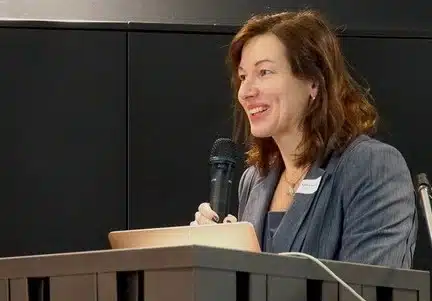The COST Action ‘Multi-disciplinary Innovation for Social Change’ (SHIINE) has become a powerful force for educational change across Europe. Born from a collaboration between Tallinn University and Northumbria University, the initiative was led by Associate Professor Katri-Liis Lepik, who recognised the growing gap between traditional teaching methods and the increasingly complex challenges of our modern world.
“Through SHIINE, we have inspired hope, ignited innovation, nurtured networks and empowered communities to transform higher education institutions (HEIs) for a better, collaborative future,” reflects Katri-Liis , capturing the essence of the Action’s mission to integrate HEIs with the public and private sectors through design-led and problem-oriented approaches.
“Through SHIINE, we have inspired hope, ignited innovation, nurtured networks and empowered communities to transform higher education institutions for a better, collaborative future”.
Prof. Katri-Liis Lepik, Chair of the Action SHIINE

The Action identified a critical need to prepare students for the challenges of the 21st century. It focused on supporting creativity, employability, and multidisciplinary learning. As the Chair notes, “Students and teaching methods have become more sophisticated, and the world around us has become more complex. This has created opportunities for innovation in education”.
A network of specialised innovation hubs
One of the key achievements of SHIINE was the establishment of several innovation labs across Europe, collectively known as the ‘5 Seas Labs’ – located around the North, Black, Baltic, Adriatic and Mediterranean Seas. These labs were a direct result of the Action’s research into different types of innovation spaces, with a particular focus on public sector innovation.
Dr Peter Meister-Broekema, who led one of the Action’s working groups, explains how the concept developed: “In our work package, we carried out an analysis of different types of ‘labs’, focusing on public sector innovation labs. This led to the understanding that the creation of labs could be an important sustainable outcome of the project. It also proved that labs are never the same in every concept”.
Each lab has emerged with its unique focus while sharing the common goal of fostering social innovation through collaborative, design-led approaches. The labs serve as spaces for open innovation, engaging stakeholders to generate new ideas and co-create solutions to societal challenges. They act as learning spaces for education and training, promoting a culture of openness and innovation.
The ‘5 Seas Labs’ network includes several specialised hubs, each addressing different aspects of social innovation:
The Responsible Innovation Hub (ReIn) – North Sea
Based at Northumbria University in the UK, ReIn helps people and organisations find better ways to tackle big societal challenges. It includes the nDESIS Lab (Northumbria Design for Social Innovation and Sustainability) and creates spaces where different groups can work together to understand complex problems and explore more equitable solutions.
ReIn’s work is guided by the United Nations Sustainable Development Goals, which help shape its research and activities.
The lab focuses on responsible innovation, which means encouraging thoughtful and ethical approaches to change. Through research, Seminar Series on YouTube, and hands-on projects, such as Responsible Design Week, ReIn supports new ideas that can have a positive impact at local, national, and global levels.
Black Sea Multi-disciplinary Innovation Laboratory (BS MILab) – Black Sea
Established at Burgas Free University in Bulgaria, BS MILab brings together expertise from multiple fields to address social challenges. Its mission is to foster innovation that drives positive change in education, business, technology, and entrepreneurship. The lab also works to shape educational policies and promote knowledge sharing between national and international scientific organisations.
BS MILab focuses on key areas such as sustainability, protection of critical infrastructure, transport and maritime law, educational innovation, and digital transformation. Through expert discussions, scientific events, and training sessions, it connects universities, businesses, governments, and communities across the Black Sea region to help them collaborate on regional and global challenges.
In recent years, BS MILab has played an important role in the Blue Growth Accelerator initiative, supported by the Horizon 2020 Doors project.

“The Blue Growth Accelerator has been a key driver in connecting research with real-world solutions, and we are proud to see its impact grow,” explains Prof. Milen Baltov, SHIINE Action Core Group member and main facilitator. “In 2024, BS MILab also launched a series of conferences on ‘Multidisciplinary Innovations for Social Change’, which will continue in different countries, bringing together SHIINE Action participants in the years ahead”.
DiakHub – Baltic Sea
DiakHub, at Diaconia University of Applied Sciences in Helsinki, Finland, is a centre for developing new solutions to complex social challenges. It brings together experts, students, businesses, policymakers, and community organisations to create practical, research-based innovations that improve social services and education.
The hub focuses on human-centred solutions, especially for people with complex needs who rely on multiple services. By working across different sectors – education, business, government, and society – DiakHub helps improve public services and make them more effective and inclusive.
Students play an active role, contributing to research and innovation as part of their studies. DiakHub is a key part of Diakonia University’s strategy. It shaps future professionals and advances new ways to support social well-being in Finland and beyond.
Western Balkan Sport Innovation Lab – Adriatic Sea
Located in Podgorica, Montenegro, the Western Balkan Sport Innovation Lab, connects sport with business, research, and industry to drive innovation in the region. It focuses on creating business opportunities, managing research and investment projects. It also develops new solutions that address health, social, environmental, and market challenges.
The lab works in three key areas: advocacy, research, and services. It influences policymakers at national, regional, and European levels to increase support and funding for sport and physical activity. Through research, it develops projects that expand knowledge across the sports industry. Its service activities help share scientific findings and innovations with businesses, athletes, and sports professionals across the Western Balkans.
Dr Stevo Popovic, who founded the lab following his short-term scientific mission within the SHIINE Action, shares: “This initiative not only exemplifies the power of international cooperation facilitated by COST Actions, but also marks a milestone in the advancement of research and development within the Western Balkan sports community. And it contributes greatly to the development of the next generation of researchers and innovators in the field of sports science”.
The Disability Studies and Social Innovation Lab (DSSI Lab) – Mediterranean Sea
Established at ELTE University in Budapest, Hungary, the DSSI Lab provides a platform for the development of innovative solutions for people with disabilities. The supportive professional atmosphere of the COST SHIINE Action facilitated the establishment of the Lab, which now strengthens social innovation between people with disabilities and academic stakeholders.
As Dr Csilla Szauer and Dr Anikó Sándor explain, “DSSI Lab is characterised by its co-productive approach, where developers with and without disabilities work together on all projects”. The Lab has made a significant contribution to research on social innovation in the disability field. It has published studies on how the public sector can participate in these innovations and identify key drivers for their development.

Its research has shown that the legal and financial environment, networking, awareness-raising initiatives and the participation of people with disabilities are key drivers. The Lab promotes participatory development activities that amplify and empower the voices of participants while innovating for communities. The DSSI Lab’s recommendations highlight participatory innovation as a cutting-edge practice that supports the social inclusion of people with disabilities by making education more diverse.
Centre for Social Innovation and Social Entrepreneurship – Additional Lab
Vaxandi, based at the University of Iceland, is a centre for social innovation that supports new ideas and solutions to improve society. It focuses on researching social progress, encouraging innovation, and strengthening non-profit organisations, service users, and citizens.
The centre sees social innovation as developing and applying new products, services, or models that meet social needs and create stronger communities. Vaxandi provides a platform for collaborative research, workshops, and education. It helps people and organisations turn ideas into practical solutions that improve well-being and social inclusion in Iceland.
Legacy and continuing impact
The 5 Seas Labs are the living legacy of the SHIINE Action, continuing to drive innovation in their respective fields. They embody the Action’s commitment to transforming higher education and fostering social change through design-led approaches.
As Peter Meister-Broekema proudly notes, “I was deeply honoured when a partner told me that he had never heard of a social innovation lab, but now he was implementing one in his country”. This ripple effect shows how the Action not only created innovation spaces, but also spread the concept and methodology to regions where such approaches were previously unknown.
Through its emphasis on multidisciplinary collaboration, problem-solving, critical thinking and design-led innovation, SHIINE has equipped educators, researchers and policymakers with innovative tools and frameworks to address complex societal challenges. The 5 Seas Labs are a testament to the Action’s success in bridging the gap between traditional educational methods and the demands of our rapidly changing world.






Additional information
View the Action website
Read the Action brochure Social Innovation in Higher Education: Landscape, Practices, and Opportunities
Discover the SHIINE YouTube webinar series ‘Design Matters’
